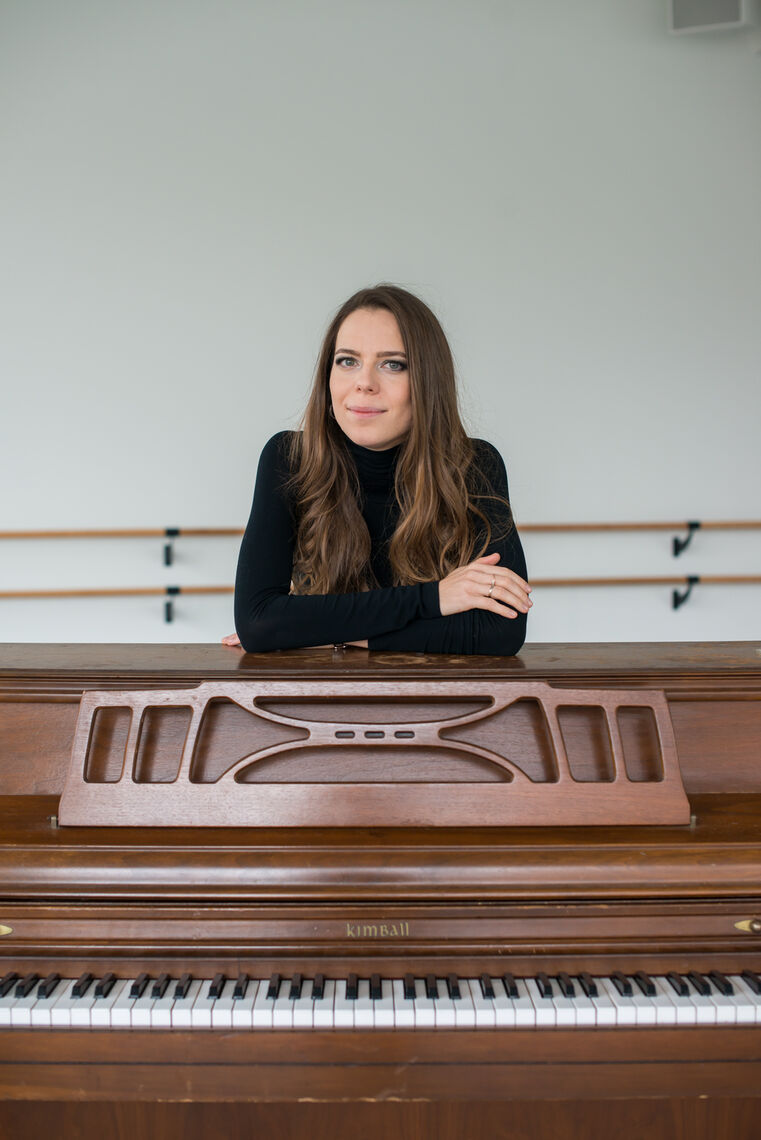P.D. Soros Fellowship for New Americans
If you are an applicant and need to sign into the online application, you can find the link on the "Apply" page of our website: Apply Page.
If you are a fellow looking to login, please note that we are currently updating our backend system for managing Fellow data. In the meantime, to update your information for the Fellowship, please send updates to Nikka Landau at nlandau@pdsoros.org.
Polina Nazaykinskaya: How I'm Shaping Culture
Born in Togliatti, an industrial city on the Volga River in Russia, composer and Paul & Daisy Soros Fellow Polina Nazaykinskaya was surrounded by music growing up. Polina's mother often recalls when, at just two years old, Polina reached for the piano and played a small segment from the final scene of Glinka's "Life for the Tsar", which Polina had heard her siblings practicing, but had never been taught.
Polina entered the Moscow Tchaikovsky Conservatory with the intention of becoming a concert violinist, but quickly realized that her true calling was composition, as music would frequently "visit" her, and "write itself." As she finished her bachelor's degree, she realized that she could not stay in Russia if she wanted to be a composer. She wanted to be in the United States, where there were more opportunities to be a professional composer and musician.
When her letter of admittance to the Yale School of Music arrived, Polina held it as though it were a lottery ticket. At Yale, she worked with Christopher Theofanidis and Ezra Laderman, and completed a master's degree in composition and theory, in addition to receiving an artist diploma in composition. "Winter Bells", the first orchestral piece that Polina wrote in the United States, received wide acclaim, and was recorded by Sony Music in 2010.
Now pursuing a doctorate degree in composition at the Graduate Center, CUNY, Polina is studying with Tania León. Polina has won numerous awards, including the Charles Ives Scholarship from the American Academy of Arts and Letters, and has garnered performances by ensembles including the Minnesota Orchestra, the United States Army Orchestra, and the Russian National Orchestra.
We asked Polina how she is shaping culture:
When did you know you wanted to be a composer?
For as long as I can remember, I was drawn towards music and recognized composition as a powerful vehicle of expression. At the age of five, I began to study the piano and the violin at a Music Academic Gymnasium, and at the age of 17 I enrolled into a music program at the Tchaikovsky Conservatory in Moscow. During my formative years at the Tchaikovsky Conservatory I realized that composition was my true calling in professional life.
All these years later, what excites you most about composing now?
The process of creation, which starts from chaos and agony and culminates in order, brings me immense satisfaction when I am able to find new means of expressing complex ideas and feelings using the musical language.
How do you see music playing a role in social change today in the United States?
In a climate of division and polarization, music can unite us, while reinforcing the importance of listening and respecting one another. I strongly believe that music has the capacity to bring social transformation, as much as it can change the audience members by bringing a greater awareness of the self in relation to the person’s social milieu. In that sense, music can also be an effective means to call attention to issues such as social justice, discrimination, poverty, and violence.
Are there specific social issues you hope to impact through your work?
To paraphrase a famous poet, we are not granted foresight to predict how our word will echo through the ages. One of the foundations that I support through my work and my music is Birds for Sofia, a charity which helps to fund life-saving treatments for children with rare genetic diseases who cannot afford expensive medications due to lack of health insurance and inadequate financial support. The cost of some of the treatment options can be millions of dollars, while the window to administer the life-saving treatment is less than two years from birth.
Are there composers or musicians who particularly inspire you?
I am finishing my dissertation devoted to the analysis of style and works of a great Russian composer, Georgy Sviridov, who largely remains unknown in the West. I love his melodies and I have deep reverence for the unique stylistic devices that he developed, which blend a centuries old folk music with a modern sound that transcends time.
What are you currently working on?
I'm currently working on a full-length opera commissioned by the Mississippi Opera in collaboration with Konstantin Soukhovetski, a truly unique and brilliant musician, a PD Soros Fellow and my closest friend. I am also working on a new ballet commissioned by MorDance and my Symphony N.2 commissioned by the Portland Youth Philharmonic.
I am thrilled to become a collaborating artist with Site-Specific Dances, a dance-based, interdisciplinary arts collective led by choreographer/director Michael Spencer Phillips. Currently, we are working on a large-scale installation. Fenix is a reimagined symphonic poem that combines my music and Phillips’ environmental dance theater work, which is filmed and edited by Emma Kazaryan. The piece showcases community-based dancers against the dramatic red rock landscapes-imparting reverence for our precious natural world, its epic scale, its ever-changing dynamics, and our human imprint on these environments. Our goal is for the film to be exhibited and performed with a live orchestra in concert halls as well as more experimental venues with immersive formats. We are partnering with New York City-based architecture studio MP New York City, led by Dino Kiratzidis, who will design the immersive exhibition component of the piece. ∎
© 2024
